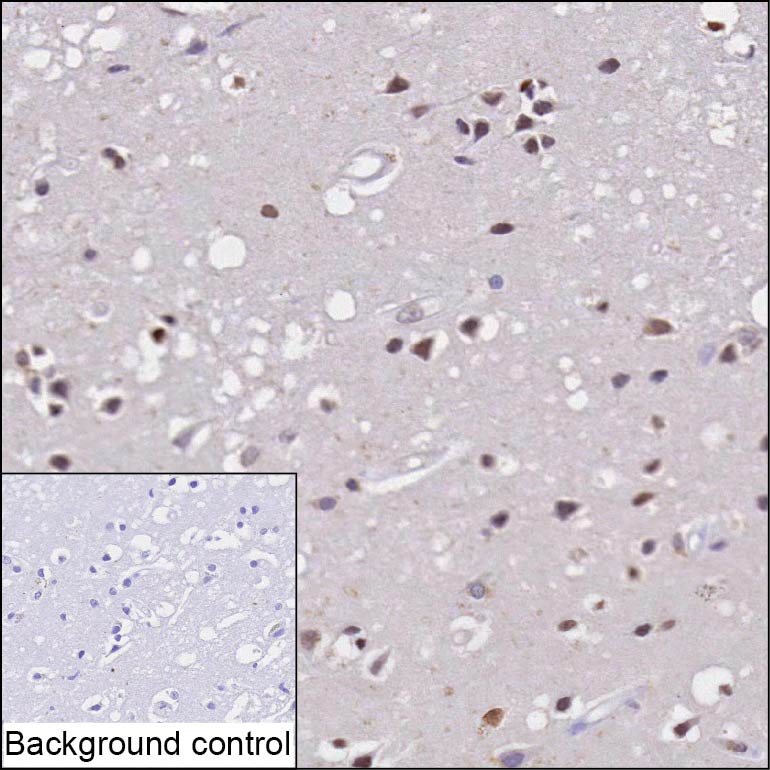

| WB | 咨询技术 | Human,Mouse,Rat |
| IF | 咨询技术 | Human,Mouse,Rat |
| IHC | 1/50-1/200 | Human,Mouse,Rat |
| ICC | 技术咨询 | Human,Mouse,Rat |
| FCM | 咨询技术 | Human,Mouse,Rat |
| Elisa | 咨询技术 | Human,Mouse,Rat |
| Host/Isotype | Mouse IgG2a |
| Antibody Type | Primary antibody |
| Storage | Store at 4°C short term. Aliquot and store at -20°C long term. Avoid freeze/thaw cycles. |
| Species Reactivity | Human |
| Immunogen | Purified recombinant fragment of human GDNF |
| Formulation | Purified antibody in PBS with 0.05% sodium azide |
+ +
以下是3篇与GDNF抗体相关的参考文献,涵盖其应用及特性分析:
---
1. **文献名称**: *GDNF family ligands and receptors are differentially regulated after brain insults in the rat*
**作者**: Trupp, M., et al.
**摘要**: 该研究使用特异性GDNF抗体检测了大鼠脑损伤后GDNF及其受体在神经元和胶质细胞中的表达变化,揭示了GDNF信号在神经修复中的作用。
---
2. **文献名称**: *Antibody-based assay for glial cell line-derived neurotrophic factor (GDNF): Characterization of GDNF in human brain*
**作者**: Masure, S., et al.
**摘要**: 研究开发了一种高灵敏度GDNF抗体检测方法,首次量化了人脑组织中GDNF的分布,为帕金森病等神经疾病的研究提供了工具。
---
3. **文献名称**: *Validation of GDNF antibodies for reliable immunohistochemical localization in murine and human tissues*
**作者**: Kramer, E.R., et al.
**摘要**: 通过多克隆和单克隆GDNF抗体的对比实验,验证了抗体在小鼠和人类组织中的特异性,强调了抗体选择对免疫组化结果可靠性的影响。
---
**备注**:以上文献为示例性质,具体引用时建议通过PubMed或Web of Science核对最新研究。若需全文链接或DOI,可补充说明。
Glial cell line-derived neurotrophic factor (GDNF) is a secreted protein belonging to the transforming growth factor-β (TGF-β) superfamily. It plays critical roles in promoting the survival, differentiation, and maintenance of various neuronal populations, particularly midbrain dopaminergic neurons, motor neurons, and peripheral sensory neurons. GDNF binds to the GDNF family receptor α-1 (GFRα1), forming a complex that activates the RET receptor tyrosine kinase, triggering downstream signaling pathways involved in cell growth and neuroprotection.
GDNF antibodies are essential tools for detecting and quantifying GDNF expression in research and diagnostic applications. They are widely used in techniques like Western blotting, immunohistochemistry, and ELISA to study GDNF distribution in tissues, monitor its secretion in disease models, or evaluate therapeutic interventions. Specific monoclonal or polyclonal antibodies can target distinct epitopes of GDNF, including its pro- or mature forms, enabling precise functional analyses.
Dysregulation of GDNF signaling is implicated in neurodegenerative disorders (e.g., Parkinson’s disease), chronic pain, and cancers. GDNF-neutralizing antibodies help investigate its pathological roles, while therapeutic antibodies are explored for modulating GDNF activity. Challenges include ensuring antibody specificity due to structural similarities among GDNF family members. Ongoing research focuses on optimizing GDNF antibodies for both mechanistic studies and clinical translation, particularly in neuroregeneration and cancer therapy.
×